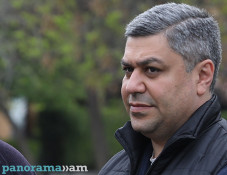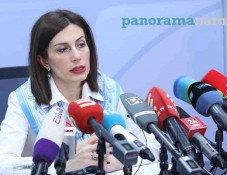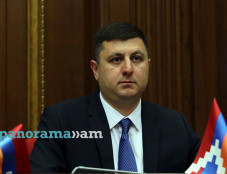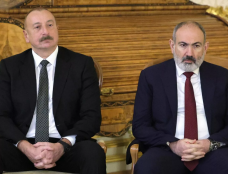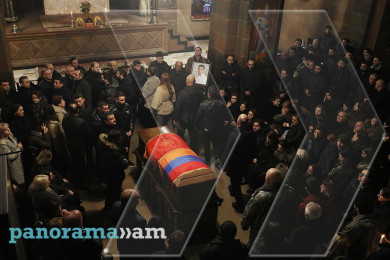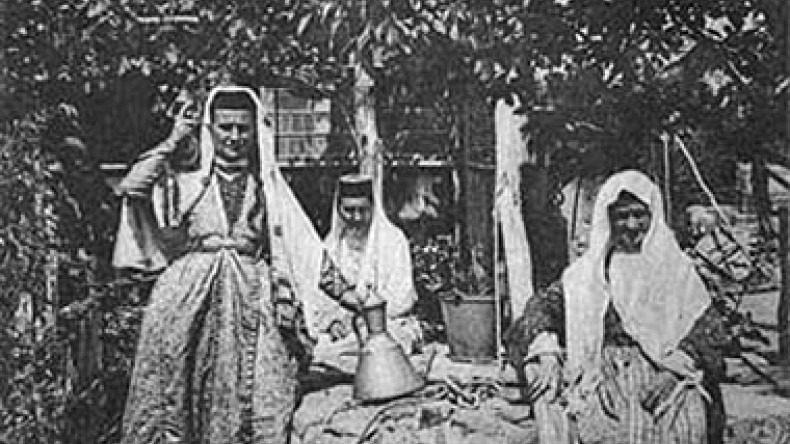
Scientific publication: Armenian girl thinks it mortal sin to go against father, Tatar girl is indifferent to family
In the 20th issue for the year 1894 of the project “Collection of Materials to Describe the Terrain and Tribes in the Caucasus,” the teacher and supervisor of the Batumi vocational school, A. Zakharov, published an article, in which he recounts the marriage traditions among the Transcaucasian Tatars and their practice of getting married with children and relatives.
The urban Tatar women led an idle life, and taught their daughters to live like that as well. The daughters of well-to-do Tatars often did not know how to saw, cut, knit, Zakharov writes.
According to the article, the women and young girls almost did not stay at home. Every morning one could see them in the streets going to the suburbs or near parks in a happy group. Therе, they sat cross-legged on carpets in the shade of some tree in the fresh air, and drank tea, smoked shisha, chatted freely and laughed. “A noisy active life is not characteristic of an urban Tatar woman. She is able to sit motionless on the same place the whole day long just to chat with someone. Possibly that is the reason why the Tatar women of the towns quickly get excessively thick,” the author points. Even the young girls were not fond of running and frisking; they preferred to sit on the grass or cloths and chat like the adults.
Sitting, they laughed or played games which did not suppose moving. One of the young girls’ favorite activities was fortunetelling. It was done in the following way: one of the girls took various objects from the group, like rings, little keys or coins, and hid them in a small pouch or wrapped them in a handkerchief. After, she put it in the center of the circle made by the girls. As they started singing couplets, a little girl took an object out of the pouch. The girls told the fortune of the owner of the object by the couplet they were singing the moment it was taken out. Despite the men being banned from being in the places where the women or girls were, they had secret dates with young men in the parks.
According to the author, the marriages were based on expediency in the villages. The parents tried to marry their girl to a rich man, which resulted in such “incongruous couples” as a 50-or-60-year-old man – having married sons and grandchildren – married with a girl of 12 or 13 years, or the opposite, a six-or-seven-year-old boy married with a girl of 13 or 14. Tatars affianced their children in the cradle; that is why one could often see a six-or-seven-year-old boy reprimanding a girl of his age or beating her. When asked why he was beating her, he gave an answer filled with “a pride recognition of his rights” – she was his fiancée. “One I gave a candy to a 5-year-old girl. She immediately ate the half of it, and wrapped carefully the other half in her shirt. ‘Who are you hiding it for?’ I asked. ‘For my fiancé,’ she said. Meanwhile, the fiancé, a boy of her age, was standing, without trousers, not far from us and was glaring at his fiancée. Apparently, he was extremely discontent that the girl had eaten the half of the candy without his permission,” Zakharov assumes. He also writes about another strange custom of affiancing children even before their birth. This mainly happened when the children’s betrothal was needed to put an end to the years-long animosity between their families.
Zakharov notes that marriages between close relatives are made most often. Cousins married each other, and a girl would rather wish to marry her cousin than a stranger.
“A young man is ashamed if someone else marries his cousin. A girl hopes that the marriage with her cousin would save her from beatings for being a close relative,” he writes.
The Tatars had the following tradition of marrying young people: when a Tatar villager intended to marry his son, he told his relatives about it, and they recommended a fiancée for him. A Tatar considered completely unnecessary and even indecent to ask whether his son agreed. The son, too, could not openly tell him that he fancied a girl. The only option to influence his father was through mother or relatives. One way or another, the father’s opinion was decisive in the fiancée’s choice, and the son had no right to go against him. The girl’s role in marriage matters was not a happy one, either. The father was ashamed to ask for his daughter’s agreement, and even a smallest hint could dishonor her in the eyes of good-minded people and ruin her. “A girl does not and cannot have her own will in those matters. Even her mother had no right over the daughter. ‘She is my daughter. I can drink her with water or eat her with bread if I wish,’ a Tatar would say decisively pushing aside any interference into his paternal rights,” the author writes.
Becoming a fiancée deprived the girl of the freedom she had before the moment of matchmaking. As the Tatars used to say, she became “her fiancé’s ware” after that. “She is really called like that – a ware. A Tatar will not ask whose fiancée is that girl, but rather whose ware she is,” Zakharov writes. He points that father did not give any dowry for the girl, but on the contrary, got bride price from the fiancé, which, after all, was used for the girl’s future needs.
In the towns, the young men were relatively freer in choosing a fiancée. However, in case the girl’s relatives guessed the young man’s intentions, they would attack and beat him – sometimes to death. The girl’s fate depended on her father or brother. “Incongruous marriages” were often made in town, as well, when a man of 50 or 60 years got married with a girl of 12 or 13 years. “I can remember such a case, when a 10-year-old girl was married to a man of 50 years. She appeared to be unable for matrimonial cohabitation, and the relatives of the husband sent for a woman barber surgeon. The unhappy girl died during the surgery,” the author writes. He also recalls another hideous case a Tatar woman had told him about. A girl, eight or nine years old, was given in marriage to an elderly man. She would not surrender herself, she screamed, she cried, she ran away from him. As her family exhorted her, she repeated, “I do not want to go to him. He is a nasty and detestable old man. He is indecent to me.”
According to the author, with age, the Tatar men were getting more and more attracted towards young girls. Sometimes, if a wealthy old man liked a girl he saw in the street or somewhere else, he would make a proposal right away, despite having a wife and children. The girl’s parents were glad to give her in marriage to a wealthy old man. “I knew an old Tatar who was told to have been married six times with young girls, yet none of them survived even the first wedding night,” he writes.
Comparing the Armenian and Tatar girls, the author writes that the Tatars were more independent. “An Armenian girl considers it a mortal sin to go against her father’s will. She would sacrifice herself just not to be cursed by her father or mother. A Tatar girl has no such feelings towards her parents, she is only afraid of them. She does not fear from her father’s curse, nor is she touched from her mother’s tears. She is neither afraid nor ashamed of what people would say, either. She is ready to run away from her paternal house even though she knows that this will cause her parents a great disappointment,” Zakharov writes.
If a Tatar girl were in love with someone, she would find a way to meet him, and if her parents refused to give her in marriage to him, she would run away from the family. “This may be the reason why the parents try to marry their daughters early,” the author assumes. He adds that a Tatar girl in love was fearsome – she saw no obstacles when it came to satisfying her passion.
“I have seen a bloodstained girl beaten almost to death by her father and brothers. She was ferociously defending herself and cursing her tormentors out as they did not let her run to her lover,” the author writes.
To be continued.
The “Collection of Materials to Describe the Terrain and Tribes in the Caucasus” is a large-scale publication of narrative sources carried out by the management of the Caucasus Educational Okrug in 1881-1908. It includes researches and description of the history, life, and ethnographic characteristics of the peoples inhabiting the Caucasus region of the Russian Empire.
Related:
Scientific publication: Azerbaijan Tatar children played in manure, women’s untidiness became proverb
Scientific publication of Russian Empire: Tatar women were known for unbridled speech and indecent tricks
Newsfeed
Videos





